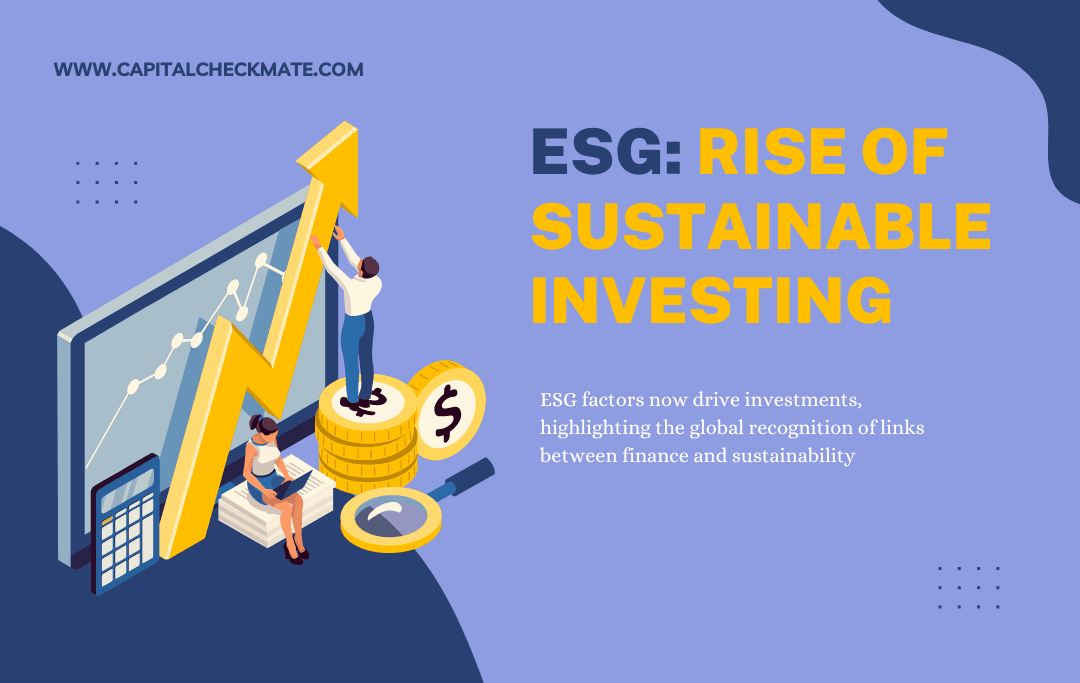Rise of Sustainable Investing: The Explosive Growth of ESG
In recent years, sustainable investing has evolved from a niche concept to a mainstream investment strategy, reshaping the way individuals and institutions approach their portfolios. ESG has become prominent criteria for sustainable investing.
ESG (Environmental, Social, and Governance) criteria have become key drivers of investment decisions, reflecting a growing global awareness of the interconnectedness between financial performance and sustainability.
This blog explores the meteoric rise of sustainable investing and the profound impact of ESG considerations on the financial landscape.
The ESG Framework Explained
Before delving into the growth of ESG investing, let’s understand what ESG entails:
- Environmental (E): Environmental factors assess a company’s impact on the planet. This includes its carbon footprint, energy efficiency, resource management, and commitment to sustainability initiatives such as renewable energy and waste reduction.
- Social (S): Social factors evaluate a company’s treatment of its employees, customers, and the communities it operates in. This encompasses issues like labor practices, diversity and inclusion, human rights, and community engagement.
- Governance (G): Governance criteria focus on a company’s leadership, board structure, and internal policies. This includes transparency, ethical behavior, anti-corruption measures, and executive compensation.
The Explosive Growth of ESG Investing
- Mainstream Acceptance: ESG investing has transitioned from a niche approach to a mainstream strategy. Major institutional investors, such as pension funds and asset management firms, are now integrating ESG considerations into their investment processes. This acceptance has driven substantial growth in sustainable investment assets.
- Record Inflows: The influx of capital into ESG-focused funds and assets has been staggering. In 2020, sustainable funds attracted record inflows, with billions of dollars pouring into ESG investments. This trend shows no signs of slowing down, with continued growth expected in the coming years.
- Global Adoption: Sustainable investing is no longer limited to Western markets. Countries across Asia, Europe, and the Americas are embracing ESG principles, resulting in a global movement toward sustainable finance.
- Corporate Commitment: Corporations are recognizing the importance of ESG as a driver of investor and consumer sentiment. Many are incorporating sustainability into their business strategies, setting ambitious ESG targets, and releasing annual sustainability reports.
- Regulatory Initiatives: Governments and regulatory bodies are taking steps to promote ESG integration. Regulations and disclosure requirements are being introduced to ensure greater transparency and accountability in ESG reporting.
The Benefits of ESG Investing
- Risk Mitigation: ESG factors can help investors identify and mitigate risks that traditional financial metrics might miss. Companies with strong ESG practices tend to be more resilient in the face of environmental, social, and governance challenges.
- Long-Term Performance: Numerous studies have indicated a positive correlation between strong ESG performance and long-term financial outperformance. Companies that prioritize sustainability often attract investors looking for stable, forward-thinking businesses.
- Alignment with Values: ESG investing allows individuals and institutions to align their investments with their values and beliefs. It offers a way to support companies that share a commitment to sustainability and responsible business practices.
Challenges and Considerations
While the growth of ESG investing is remarkable, it comes with challenges:
- Standardization: The lack of standardized ESG metrics and reporting can make it challenging to compare companies and funds consistently.
- Greenwashing: Some companies and funds may exaggerate their ESG efforts, leading to concerns of “greenwashing.” Investors must conduct thorough due diligence to ensure authenticity.
- Evolution of ESG Criteria: ESG criteria are evolving, and what is considered sustainable today may change in the future. Remaining well-informed and adaptable is essential for investors.
Conclusion
The rise of sustainable investing, driven by the explosive growth of ESG, signifies a monumental shift in the financial landscape. ESG considerations have transcended the realm of ethical investing, becoming integral to portfolio strategies.
As sustainability continues to shape the business world, investors who embrace ESG principles are not only aligning their investments with their values but also positioning themselves for long-term financial success. The ESG movement is more than a trend; it’s a fundamental transformation in how we view and approach finance.


